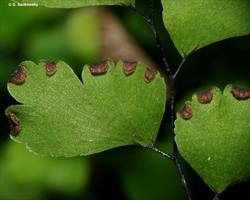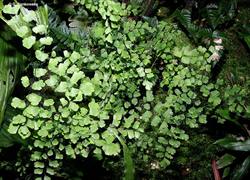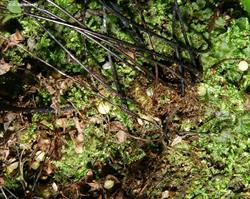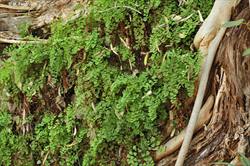Pteridaceae
Australian Tropical Ferns and Lycophytes - Online edition
Adiantum capillus-veneris




Adiantum capillus-veneris L.
Link to Australian Plant Name Index for publication details and synonyms: https://id.biodiversity.org.au/name/apni/76375
Maidenhair Fern
Rhizome short-creeping, suberect, branched, to 5 mm diam.; scales concolorous, yellow-brown, with entire margins. Fronds tufted, to 36 cm long. Stipe to 18 cm long, glossy, glabrous, brittle. Lamina 2–3-pinnate, triangular, 5–20 cm long, 4–15 cm wide, delicate, membranous. Pinnae rectangular or elliptic; rachis flexuose, wiry. Pinnules ovate to triangular, shortly stalked throughout, symmetric and cuneate-flabellate or subdimidiate, glabrous; distal margins irregularly and deeply lobed, denticulate when sterile; stalks not articulated; veins red-brown near junction with stalk, otherwise pale. Sori 1–10 along distal margins, 1 or 2 per lobe; soral flaps oblong to subreniform, not or scarcely indented into the lamina margin, glabrous. Spores 64 per sporangium, pale brown; perine scabrous; largest diam. (43–) 48.1 (–60) µm.
Widespread in the southern hemisphere. In
Lithophytic or terrestrial, usually on alkaline soils. Often on moist shaded rock walls or at the mouth of caves on limestone or sandstone.
This is a commonly cultivated ornamental fern in tropical, subtropical and temperate areas. It is suited to cultivation in a semi-shaded part of the garden or in a greenhouse. It is suited to cultivation in the ground or in a container planted in a free-draining terrestrial growing medium.
Key to some Adiantum species of tropical
1a. Fronds pinnate = Adiantum philippense
1b. Fronds bipinnate or higher = 2
2a. Pinnules flabellate to rounded = 3
2b. Pinnules obliquely oblong to rhomboid = 5
3a. Soral flaps broadly attached to lamina and situated on the ends of lobes with incisions between them = Adiantum capillus-veneris
3b. Soral flaps reniform and narrowly attached to lamina and situated in incisions of the lamina margin with lobes between them = 4
4a. Rhizome long creeping, rhizome scales translucent with entire margins, plants stoloniferous and spreading, pinnae pale bright green when mature = Adiantum aethiopicum
4b. Rhizome short creeping, rhizome scales opaque with denitculate margins, not stoloniferous plants tufted, pinnae dark green when mature = Adiantum atroviride
5a. Rhizome long creeping, fronds scattered = 6
5b. Rhizome not long creeping, fronds tufted = 7
6a. Primary pinnae progressively reducing in length from base to apex of frond resulting in a triangular lamina = Adiantum formosum
6b. Primary pinnae equal in length resulting in an ovate lamina = Adiantum silvaticum
7a. Pinnae soft and membraneous with fine black hairs on the undersurface, root tubers present, often proliferous, stipe smooth = Adiantum diaphanum
7b. Pinnae herbaceous to coreaceous with white hairs, root tubers absent, not proliferous, stipe not smooth = Adiantum hispidulum
Field AR, Quinn CJ, Zich FA (2022) Australian Tropical Ferns and Lycophytes. apps.lucidcentral.org/fern/text/intro/index.htm (accessed online INSERT DATE).
Field AR, Quinn CJ, Zich FA (2022) ‘Platycerium superbum’, in Australian Tropical Ferns and Lycophytes. apps.lucidcentral.org/fern/text/entities/platycerium_superbum.htm (accessed online INSERT DATE).







